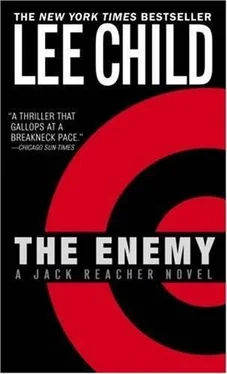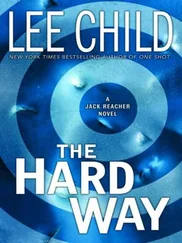
The eighth book in the Jack Reacher series, 2004
Dedicated to the memory of Adele King
As serious as a heart attack.Maybe those were Ken Kramer’s last words, like a final explosion of panic in his mind as he stopped breathing and dropped into the abyss. He was out of line, in every way there was, and he knew it. He was where he shouldn’t have been, with someone he shouldn’t have been with, carrying something he should have kept in a safer place. But he was getting away with it. He was playing and winning. He was on top of his game. He was probably smiling. Until the sudden thump deep inside his chest betrayed him. Then everything turned around. Success became instant catastrophe. He had no time to put anything right.
Nobody knows what a fatal heart attack feels like. There are no survivors to tell us. Medics talk about necrosis, and clots, and oxygen starvation, and occluded blood vessels. They predict rapid useless cardiac fluttering, or else nothing at all. They use words like infarction and fibrillation , but those terms mean nothing to us. You just drop dead is what they should say. Ken Kramer certainly did. He just dropped dead, and he took his secrets with him, and the trouble he left behind nearly killed me too.
I was alone in a borrowed office. There was a clock on the wall. It had no second hand. Just an hour hand, and a minute hand. It was electric. It didn’t tick. It was completely silent, like the room. I was watching the minute hand, intently. It wasn’t moving.
I waited.
It moved. It jumped ahead six degrees. Its motion was mechanical and damped and precise. It bounced once and quivered a little and came to rest.
A minute.
One down, one to go.
Sixty more seconds.
I kept on watching. The clock stayed still for a long, long time. Then the hand jumped again. Another six degrees, another minute, straight-up midnight, and 1989 was 1990.
I pushed my chair back and stood up behind the desk. The phone rang. I figured it was someone calling to wish me a happy new year. But it wasn’t. It was a civilian cop calling because he had a dead soldier in a motel thirty miles off-post.
“I need the Military Police duty officer,” he said.
I sat down again, behind the desk.
“You got him,” I said.
“We’ve got one of yours, dead.”
“One of mine?”
“A soldier,” he said.
“Where?”
“Motel, in town.”
“Dead how?” I asked.
“Heart attack, most likely,” the guy said.
I paused. Turned the page on the army-issue calendar on the desk, from December 31st to January 1st.
“Nothing suspicious?” I said.
“Don’t see anything.”
“You seen heart attacks before?”
“Lots of them.”
“OK,” I said. “Call post headquarters.”
I gave him the number.
“Happy New Year,” I said.
“You don’t need to come out?” he said.
“No,” I said. I put the phone down. I didn’t need to go out. The army is a big institution, a little bigger than Detroit, a little smaller than Dallas, and just as unsentimental as either place. Current active strength is 930,000 men and women, and they are as representative of the general American population as you can get. Death rate in America is around 865 people per 100,000 population per year, and in the absence of sustained combat soldiers don’t die any faster or slower than regular people. On the whole they are younger and fitter than the population at large, but they smoke more and drink more and eat worse and stress harder and do all kinds of dangerous things in training. So their life expectancy comes out about average. Soldiers die at the same speed as everyone else. Do the math with the death rate versus current strength, and you have twenty-two dead soldiers every single day of every single year, accidents, suicides, heart disease, cancer, stroke, lung disease, liver failure, kidney failure. Like dead citizens in Detroit, or Dallas. So I didn’t need to go out. I’m a cop, not a mortician.
The clock moved. The hand jumped and bounced and settled. Three minutes past midnight. The phone rang again. It was someone calling to wish me a happy new year. It was the sergeant in the office outside of mine.
“Happy New Year,” she said to me.
“You too,” I said. “You couldn’t stand up and put your head in the door?”
“You couldn’t put yours out the door?”
“I was on the phone.”
“Who was it?”
“Nobody,” I said. “Just some grunt didn’t make it to the new decade.”
“You want coffee?”
“Sure,” I said. “Why not?”
I put the phone down again. At that point I had been in more than six years, and army coffee was one of the things that made me happy to stay in. It was the best in the world, no question. So were the sergeants. This one was a mountain woman from north Georgia. I had known her two days. She lived off-post in a trailer park somewhere in the North Carolina Badlands. She had a baby son. She had told me all about him. I had heard nothing about a husband. She was all bone and sinew and she was as hard as woodpecker lips, but she liked me. I could tell, because she brought me coffee. They don’t like you, they don’t bring you coffee. They knife you in the back instead. My door opened and she came in, carrying two mugs, one for her and one for me.
“Happy New Year,” I said to her.
She put the coffee down on my desk, both mugs.
“Will it be?” she said.
“Don’t see why not,” I said.
“The Berlin Wall is halfway down. They showed it on the television. They were having a big party over there.”
“I’m glad someone was, somewhere.”
“Lots of people. Big crowds. All singing and dancing.”
“I didn’t see the news.”
“This all was six hours ago. The time difference.”
“They’re probably still at it.”
“They had sledgehammers.”
“They’re allowed. Their half is a free city. We spent forty-five years keeping it that way.”
“Pretty soon we won’t have an enemy anymore.”
I tried the coffee. Hot, black, the best in the world.
“We won,” I said. “Isn’t that supposed to be a good thing?”
“Not if you depend on Uncle Sam’s paycheck.”
She was dressed like me in standard woodland camouflage battledress uniform. Her sleeves were neatly rolled. Her MP brassard was exactly horizontal. I figured she had it safety-pinned in back where nobody could see. Her boots were gleaming.
“You got any desert camos?” I asked her.
“Never been to the desert,” she said.
“They changed the pattern. They put big brown splotches on it. Five years’ research. Infantry guys are calling it chocolate chip. It’s not a good pattern. They’ll have to change it back. But it’ll take them another five years to figure that out.”
“So?”
“If it takes them five years to revise a camo pattern, your kid will be through college before they figure out force reduction. So don’t worry about it.”
“OK,” she said, not believing me. “You think he’s good for college?”
“I never met him.”
She said nothing.
“The army hates change,” I said. “And we’ll always have enemies.”
She said nothing. My phone rang again. She leaned forward and answered it for me. Listened for about eleven seconds and handed me the receiver.
“Colonel Garber, sir,” she said. “He’s in D.C.”
Читать дальше













